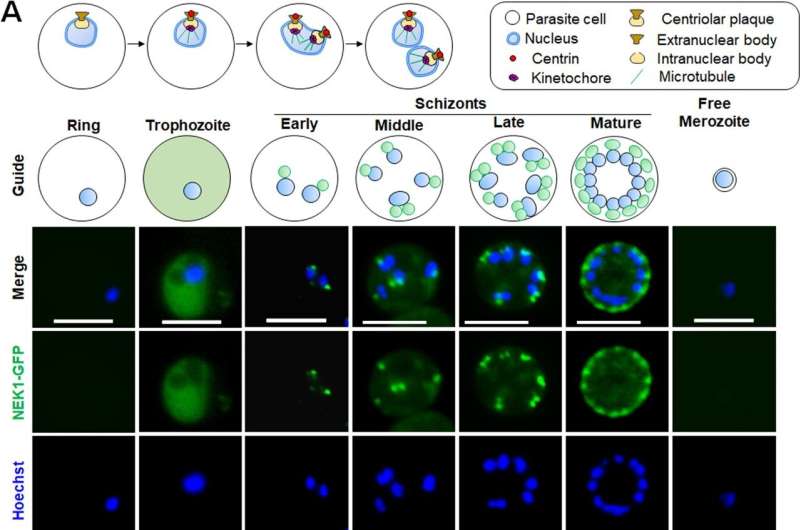
A team of scientists at the University of Nottingham, have uncovered how the parasite that causes malaria orchestrates their cell division—which is key in enabling the parasite to transmit this deadly disease.
In a new paper, published in PLOS Biology, a team of scientists at the university, along with collaborators across the globe, show how they have uncovered key regulators of how malaria parasites manage their cell division.
Malaria is a major public health issue in many developing parts of the world. It is transmitted by female mosquitoes which ingest the parasites when they bite. Malaria was responsible for approximately 608,000 deaths in 2022 (WHO) and is caused by a single-celled parasite termed Plasmodium, that invades the liver and red blood cells.
This new research is led by Professor Rita Tewari from the School of Life Sciences at the university and Professor Mathieu Brochet at the University of Geneva. It aims to unravel the atypical mode of multiplication of the malaria parasite with particular focus on the developmental stages of the parasite within the mosquito in the hope of finding new therapeutic targets.
Professor Tewari said, “It is clear by looking at COVID-19, that controlling the transmission of parasites is equally crucial in addition to controlling the disease. Hence, to have fundamental knowledge of how the parasite succeeds to divide within the mosquito and what switches it uses will help to design intervention targets.
“One of the unusual cell divisions is seen in male sex cell formation. Recently, Professor Tewari’s team of researchers have focused on some proteins called kinases. Kinases are a family of proteins which contribute to the control of nearly all cellular processes and have already become major drug targets in the fight against cancer and other diseases. However, studies on these kinases and how they are involved in cell division in Plasmodium species are scarce.”
The group have recently characterized two kinases: ARK2 and NEK1, which they have published details of how they contribute to parasite multiplication especially during transmission stages within mosquitoes.
Professor Tewari adds, “Kinases are the best drug targets and their role in parasite transmission is important to unravel. The two studies here are a step in that direction.”
The previous study detailing more on this discovery can be found in Nature Communications.
The scientists involved in the current PLOS Biology study were Mohammad Zeeshan and Sarah Pashley from Professor’s Tewari’s lab at Nottingham. Zeeshan, the first author on the paper said, “NEK1 is a functional protein that plays a crucial role in different stages of Plasmodium development. Our study reveals that the depletion of NEK1 protein from Plasmodium arrests its cell division and sexual development. This indicates that NEK1 could be a potential drug target, not only to stop the malaria disease but also its transmission.”
More information:
Mohammad Zeeshan et al, Plasmodium NEK1 coordinates MTOC organisation and kinetochore attachment during rapid mitosis in male gamete formation, PLOS Biology (2024). DOI: 10.1371/journal.pbio.3002802
Provided by
University of Nottingham
Citation:
Scientists take a major step in understanding how to stop the transmission of malaria (2024, October 1)
retrieved 1 October 2024
from https://phys.org/news/2024-10-scientists-major-transmission-malaria.html
This document is subject to copyright. Apart from any fair dealing for the purpose of private study or research, no
part may be reproduced without the written permission. The content is provided for information purposes only.


